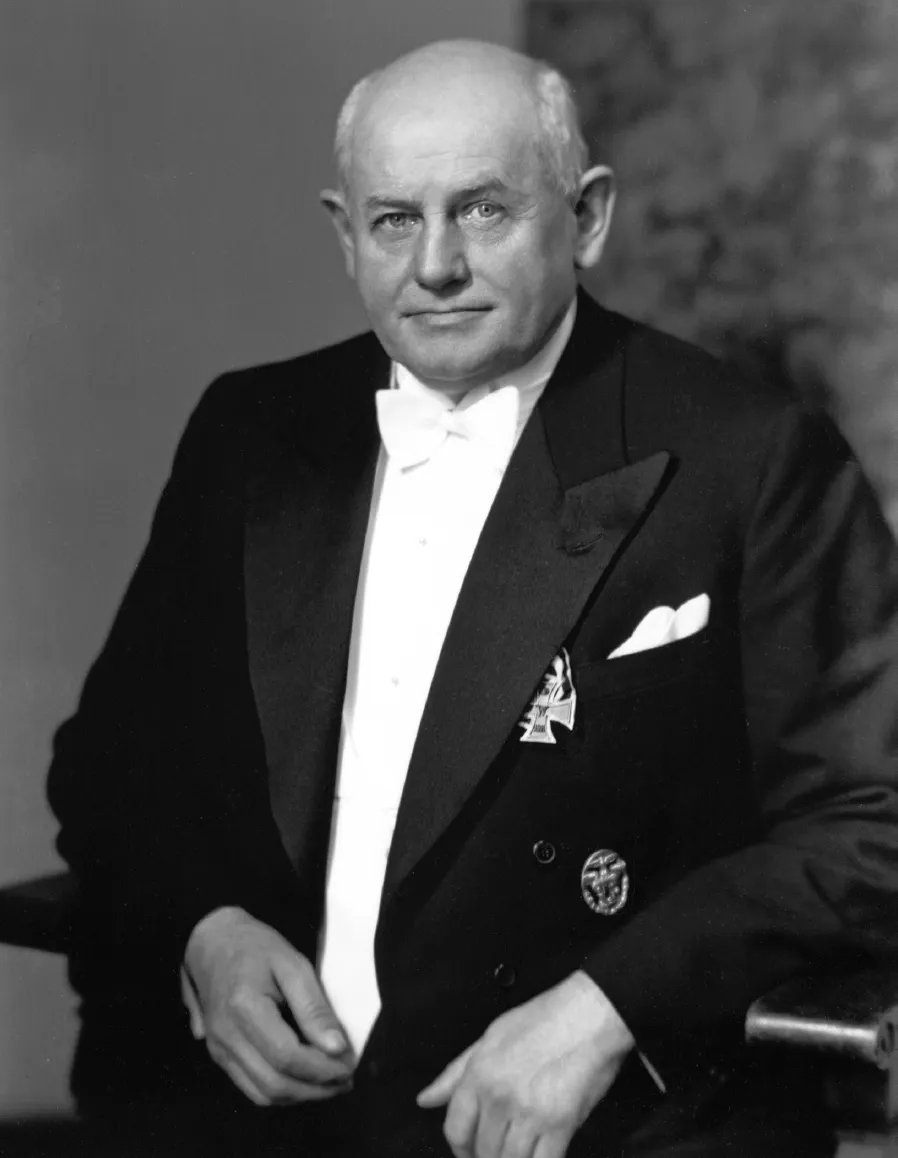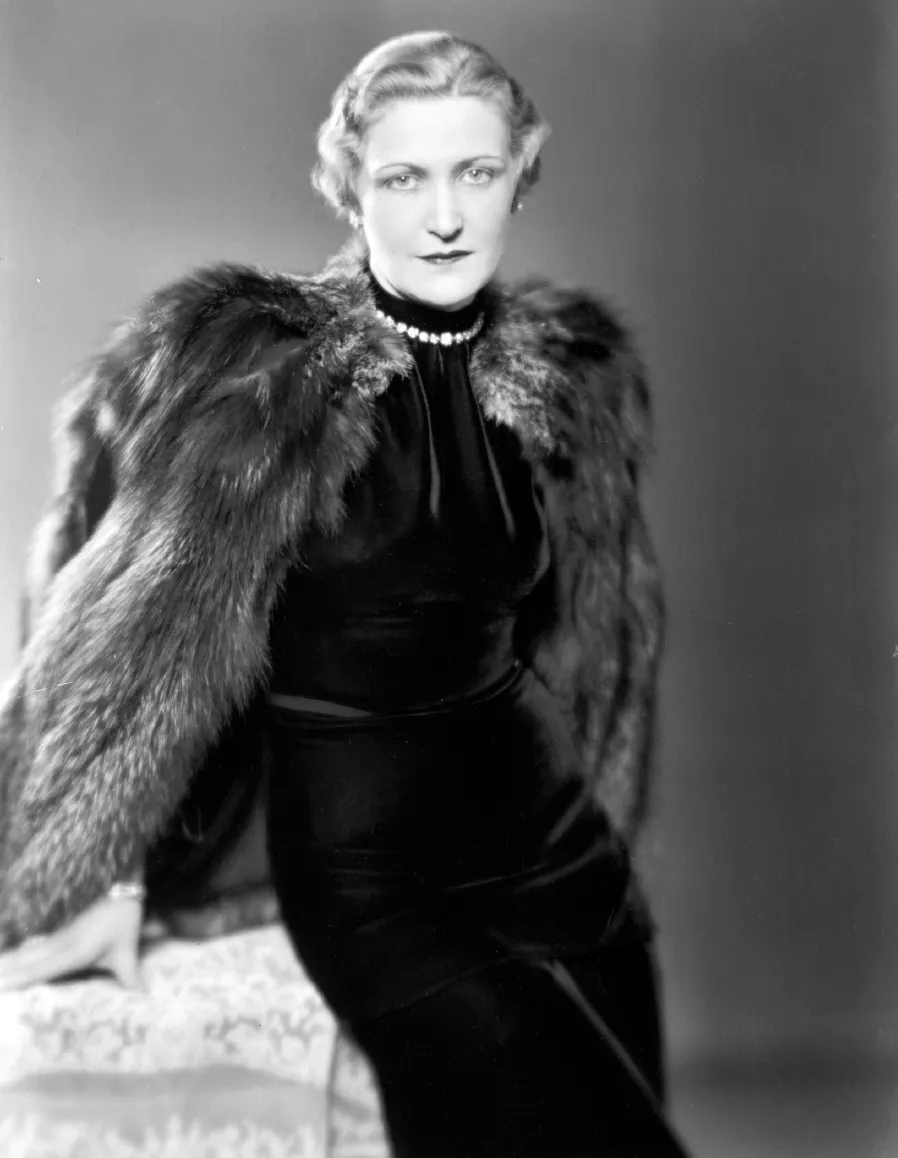2.
On the warm spring evening of April 21, 1919, Günther Quandt boarded a packed night train in Berlin. It was Easter Monday, and he was all set to travel first class, with two associates, to Kassel in central Germany, to attend a business meeting. Shortly before departure, a mother posited her teenage daughter outside the businessmen’s private compartment; the girl was weighed down with luggage and boxes. Her mother had searched the entire train for a free seat. Her parting instructions: “Magda, this is where you’ll stay put.” Günther waited two, three minutes before getting up and casually inviting the young girl to sit with them. It took many more minutes, and a few more invitations from Günther, before the timid Magda opened the compartment door and joined the trio of much older men.
After Günther helped her stow her things, Magda sank down into a plush upholstered seat. Once the two began to talk, Günther discovered just how attractive the girl was: “I had invited in an exceptionally beautiful apparition: light blue eyes, beautiful full blond hair, a well-cut, regular face, a slender figure,” he later wrote. Magda was only seventeen, twenty years younger than Günther and only six years older than his eldest son, Hellmut. Magda had just spent Easter holiday with her mother and stepfather in Berlin and was returning to her boarding school in Goslar, at the mountainous center of Germany. Günther and Magda talked throughout the entire train ride, discussing travel and Berlin’s theaters. He was infatuated with her. Around 1 a.m., the train stopped at Goslar station. Günther helped Magda get her belongings off the train; as inconspicuously as possible, he stole a glance at a luggage label and noted her boarding school’s address.
As soon as Günther arrived in Kassel, he sent Magda a letter, asking if he could visit her the following afternoon at the boarding school. He would pretend to be a friend of her father’s in order to get permission from the headmistress to take her out. Magda replied, giving her assent. The next day, Günther showed up at the school with a bouquet of roses — not for Magda, but rather to charm her headmistress into allowing Magda to take a stroll with him. A courtship began. On just their third date, during a scenic drive through the Harz mountains, Günther proposed to Magda in the back of his chauffeured car. Stunned, she asked him for three days to consider. The marriages she had witnessed over her seventeen years had been far from good.
Magda was born out of wedlock in Berlin on November 11, 1901. Her parents, the engineer Oskar Ritschel and the maid Auguste Behrend, eventually married. But Magda’s mother divorced Ritschel after discovering that he was having an affair. Auguste then remarried; her second husband, Richard Friedländer, was a German Jewish businessman. Now they too were about to get a divorce. Magda grew up an only child in a cosmopolitan, upper-middle-class household, moving with her mother and stepfather between Berlin and Brussels, where she attended a strict Catholic boarding school run by nuns. Her Jewish ties extended beyond her stepfather. When Magda met Günther, she had just split up with a boyfriend, Victor Chaim Arlosoroff, an ambitious Jewish émigré from Russia. He studied economics at Berlin’s prestigious Humboldt University. But as a shiksa, a non-Jewish woman, Magda felt that she would never truly belong in the Jewish community.
After three days of thought, Magda accepted Günther’s marriage proposal. She was bemused that this stout, older man, who wore double-breasted suits, starched collars, and golden cuff links and exuded money and power, took such an interest in her. A tall man with piercing blue eyes, a round, balding head, and a bad comb-over, Günther looked imposing — but not necessarily attractive. Yet the choice to marry someone two decades older wasn’t driven by romantic love; fascination and ambition played their part. Magda was impressed by Günther, who always wore a mischievous grin, as if he knew something that others did not. Magda longed to leave boarding school and become the wife of someone with great financial resources and esteem in the business world. She fantasized about running a large household and organizing social events for his friends and business partners. Günther, however, insisted that Magda meet two conditions before they married. She had to give up Catholicism and reconvert to Protestantism; she also had to reassume her original surname, Ritschel. Friedländer, her stepfather’s Jewish surname, was a no-go for Günther and his conservative Lutheran family. Magda dutifully obliged. She told her mother: “Religion doesn’t matter to me, I have my God in my heart.”
In early January 1921, Günther and Magda married in a spa hotel on the west bank of the Rhine, just outside Bonn. The bride wore a gown of Brussels lace. But the harmony between them didn’t last. The newlyweds’ differences in age and character quickly became painfully clear when the workaholic Günther abruptly ended their ten-day honeymoon in Italy to attend an “unmissable conference.” Even before this sudden departure, the trip had not been a success. While the couple was driving through the Italian countryside in a chauffeured Mercedes limousine, Magda discovered that her husband didn’t care much for the “real” Italy. As her mother, Auguste, later recalled, Magda realized that “fundamentally he was a man lacking all aesthetic sensibilities, a thorough-going pragmatist to whom art and beauty meant little. Nature, too, left him quite unmoved. As they traveled through Umbria, through the landscape of classical beauty and historical significance . . . Quandt was explaining to his wife the geological structure of the soil and calculating its possibilities for industrial exploitation.” The trip wasn’t a total flop, though. On November 1, 1921, a little more than nine months after their honeymoon, Magda gave birth to the one child they would have together, a son named Harald.
Günther Quandt.
bpk/Atelier Bieber/Nather
She gave birth to him alone in the hospital. Günther was working, of course. Now that they were back home in Berlin, for him there was only business; he did not cultivate a personal life. When he took a trip with his wife and sons, visits to companies or factories were the main focus. He always worked twelve-hour days, arriving at his desk at 7:30 a.m. and returning home at 7:30 p.m., “tired and battered,” Magda’s mother later recalled. “After dinner, he would sit in his chair, open Berlin’s financial newspaper, and fall asleep three minutes later.” Günther was chronically exhausted. He complained that he had no time to read books or think up new ideas. Social life barely interested him — he might attend an affair if it was business-related, but it “was only arranged if unavoidable.” This pained Magda. Events at home provided the only moments when she, housewife and hostess, could be the center of attention. But there was barely any space for married life in Günther’s world. Magda had no choice but to adapt.
Magda Friedländer.
bpk/Atelier Bieber/Nather


